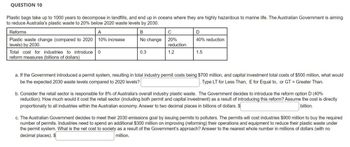
ENGR.ECONOMIC ANALYSIS
14th Edition
ISBN: 9780190931919
Author: NEWNAN
Publisher: Oxford University Press
expand_more
expand_more
format_list_bulleted
Question
None

Transcribed Image Text:QUESTION 10
Plastic bags take up to 1000 years to decompose in landfills, and end up in oceans where they are highly hazardous to marine life. The Australian Government is aiming
to reduce Australia's plastic waste to 20% below 2020 waste levels by 2030.
Reforms
A
B
с
D
Plastic waste change (compared to 2020 10% increase
levels) by 2030.
No change 20%
40% reduction
Total cost for industries to introduce 0
reform measures (billions of dollars)
0.3
reduction
1.2
1.5
a. If the Government introduced a permit system, resulting in total industry permit costs being $700 million, and capital investment total costs of $500 million, what would
be the expected 2030 waste levels compared to 2020 levels?
Type LT for Less Than, E for Equal to, or GT = Greater Than.
b. Consider the retail sector is responsible for 8% of Australia's overall industry plastic waste. The Government decides to introduce the reform option D (40%
reduction). How much would it cost the retail sector (including both permit and capital investment) as a result of introducing this reform? Assume the cost is directly
proportionally to all industries within the Australian economy. Answer to two decimal places in billions of dollars. $
billion.
c. The Australian Government decides to meet their 2030 emissions goal by issuing permits to polluters. The permits will cost industries $900 million to buy the required
number of permits. Industries need to spend an additional $300 million on improving (reforming) their operations and equipment to reduce their plastic waste under
the permit system. What is the net cost to society as a result of the Government's approach? Answer to the nearest whole number in millions of dollars (with no
decimal places). $
million.
Expert Solution
This question has been solved!
Explore an expertly crafted, step-by-step solution for a thorough understanding of key concepts.
Step by stepSolved in 2 steps

Knowledge Booster
Similar questions
- Jeff, a 56 year old professor is subject to a 28% tax rate. He has had a family emergency and must withdraw $5,000 from his IRA to fund it. How much money will he owe the government for this withdrawal?arrow_forwardA compulsary legal and unilateral payment made to the government is known as _______arrow_forwardAnalyse how macro environmental factors ( PESTLE) affect a hotel organization.arrow_forward
Recommended textbooks for you

 Principles of Economics (12th Edition)EconomicsISBN:9780134078779Author:Karl E. Case, Ray C. Fair, Sharon E. OsterPublisher:PEARSON
Principles of Economics (12th Edition)EconomicsISBN:9780134078779Author:Karl E. Case, Ray C. Fair, Sharon E. OsterPublisher:PEARSON Engineering Economy (17th Edition)EconomicsISBN:9780134870069Author:William G. Sullivan, Elin M. Wicks, C. Patrick KoellingPublisher:PEARSON
Engineering Economy (17th Edition)EconomicsISBN:9780134870069Author:William G. Sullivan, Elin M. Wicks, C. Patrick KoellingPublisher:PEARSON Principles of Economics (MindTap Course List)EconomicsISBN:9781305585126Author:N. Gregory MankiwPublisher:Cengage Learning
Principles of Economics (MindTap Course List)EconomicsISBN:9781305585126Author:N. Gregory MankiwPublisher:Cengage Learning Managerial Economics: A Problem Solving ApproachEconomicsISBN:9781337106665Author:Luke M. Froeb, Brian T. McCann, Michael R. Ward, Mike ShorPublisher:Cengage Learning
Managerial Economics: A Problem Solving ApproachEconomicsISBN:9781337106665Author:Luke M. Froeb, Brian T. McCann, Michael R. Ward, Mike ShorPublisher:Cengage Learning Managerial Economics & Business Strategy (Mcgraw-...EconomicsISBN:9781259290619Author:Michael Baye, Jeff PrincePublisher:McGraw-Hill Education
Managerial Economics & Business Strategy (Mcgraw-...EconomicsISBN:9781259290619Author:Michael Baye, Jeff PrincePublisher:McGraw-Hill Education


Principles of Economics (12th Edition)
Economics
ISBN:9780134078779
Author:Karl E. Case, Ray C. Fair, Sharon E. Oster
Publisher:PEARSON

Engineering Economy (17th Edition)
Economics
ISBN:9780134870069
Author:William G. Sullivan, Elin M. Wicks, C. Patrick Koelling
Publisher:PEARSON

Principles of Economics (MindTap Course List)
Economics
ISBN:9781305585126
Author:N. Gregory Mankiw
Publisher:Cengage Learning

Managerial Economics: A Problem Solving Approach
Economics
ISBN:9781337106665
Author:Luke M. Froeb, Brian T. McCann, Michael R. Ward, Mike Shor
Publisher:Cengage Learning

Managerial Economics & Business Strategy (Mcgraw-...
Economics
ISBN:9781259290619
Author:Michael Baye, Jeff Prince
Publisher:McGraw-Hill Education